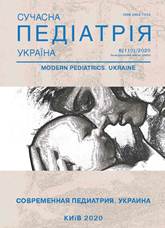Modern neurochemical and molecular genetic aspects of the pathogenesis of neonatal seizures
Keywords:
newborn, cerebral ischemia, neonatal seizuresAbstract
The article is devoted to the modern aspects of the pathogenesis of neonatal seizures (NS). The main mechanisms of the development of perinatal brain injuries, which are fundamental in the genesis of NS, are considered, the prospects for research devoted to the study of the possibilities of molecular genetic prediction of the individual risk of ischemia and the development of NS are outlined. The mechanisms of ischemic brain damage during the neonatal period and the role of glutamate, the main excitatory neurotransmitter acting on NMDA receptors that regulate the electrical activity of neurons, are described in detail. The review focuses on the involvement of metalloproteinases, primarily MMP-9, which destroys type IV collagen, which is the main component of the basement membrane of the cerebral endothelium, and creates conditions for cell migration across the BBB, thereby causing a cytokine storm and the development of inflammation, leading to NS. The possible role of calcium-dependent proteinases — calpains in the development of NS is analyzed, since in some forms of CNS pathology, uncontrolled hyperactivation of calpains is observed, leading to a disruption of the regulation of neurotransmitter transmission, which can, in turn, become an additional factor for the development of the neurodegenerative process in the brain and the development of seizures. Also are presented the results of studies devoted to the role of ion channels, providing synaptic transmission of excitation from an excited neuron to other cells. It has been shown that molecular defects in ion channels can be one of the factors that create prerequisites for the development of NS. The article shows the prospects for studying the genetic polymorphism of enzymes involved in the pathogenesis of ischemic brain damage, based on ideas about the pathogenesis of cerebral disorders in newborns, which are based on oxidative damage. The concluding part of the article outlines the modern principles of NS therapy, their main goal is to relieve the symptoms of the underlying disease, to ensure the normalization of blood circulation and brain metabolism, to optimize the conditions for the functioning of the preserved brain structures to prevent the formation of severe neurological complications, as well as to maintain optimal parameters of respiration, glucose-electrolyte composition of blood and thermal regime. Based on the data presented, it is concluded that early diagnosis of NS is necessary, which is determined by the fact that seizures in newborns are usually caused by serious damage to the child's brain, and in some cases — by life-threatening conditions, the timely diagnosis of which contributes to the early onset of specific treatment.
References
Abend NS, Jensen FE, Inder TE, Volpe JJ. (2018). Neonatal seizures. In: Volpe's Neurology of the newborn. Eds Volpe JJ, Inder TE, Darras BT, de Vries LS, du Plessis AJ, Neil JJ, Perlman JM. Elsevier: 275-324. https://doi.org/10.1016/B978-0-323-42876-7.00012-0
Baumer FM, Wusthoff CJ. (2018). Neonatal seizures: evaluation, treatment and prognosis. In: Fetal and neonatal brain injury. Eds Stevenson DK, Benitz WE, Sunshine Ph, Hintz SR, Druzin ML. 5th ed. Cambridge University Press: 655-681. https://doi.org/10.1017/9781316275498.043
Evans D, Levene M. (1998, Jan). Neonatal seizures. Arch Dis Child Fetal. Neonatal Ed. 78 (1): F702F75. https://doi.org/10.1136/fn.78.1.F70; PMid:9536846 PMCid:PMC1720746
Fox CK, Glass HC, Sidney S, Smith SE, Fullerton HJ. (2016). Neonatal seizures triple the risk of a remote seizure after perinatal ischemic stroke. Neurology. 86: 1-8. https://doi.org/10.1212/WNL.0000000000002739; PMid:27164703 PMCid:PMC4898314
Lai YH, Ho CS, Chiu NC et al. (2013). Prognostic factors of developmental outcome in neonatal seizures in term infants. Pediatr Neonatol. 54 (3): 166-172. https://doi.org/10.1016/j.pedneo.2013.01.001; PMid:23597533
Malinina EI, Chernysheva TV, Rychkova OA, Mazalova MV, Yuzhakova NYu. (2019). Koncentraciya matriksnyh metalloproteinaz-2,9 u novorozhdennyh s perinatal'noj gipoksiej. Sovremennye problemy nauki i obrazovaniya: 2. URL: https://www.science-education.ru/ru/article/view?id=28636.
Pisani F, Facini C, Pavlidis E, Spagnoli C, Boylan G. (2015). Epilepsy after neonatal seizures: literature review. Eur J Paediatr Neurol. 19: 6-14. https://doi.org/10.1016/j.ejpn.2014.10.001; PMid:25455712
Pisani F, Percesepe A, Spagnoli C. (2018). Genetic diagnosis in neonatal2onset epilepsies: back to the future. European journal of paediatric neurology. 22 (2): 354-357. https://doi.org/10.1016/j.ejpn.2018.02.006; PMid:29501409
Rennie JM. (1997, Feb). Neonatal seizures. Eur J Pediatr. 156 (2): 83-87. https://doi.org/10.1007/s004310050559; PMid:9039506
Rodriguez-Yanez M, Castillo J. (2008). Role of inflammatory markers in brain ischemia. Curr Opin Neurol. 21 (3): 353-357. https://doi.org/10.1097/WCO.0b013e3282ffafbf; PMid:18451722
Siddharth VJ, Amit M, Srinivasakumar P, Wallendor M, Culver JP, Zempel JM. (2017, May). Prediction of Neonatal Seizures in Hypoxic-Ischemic Encephalopathy Using Electroencephalograph Power Analyses. Pediatric Neurology: 64-70e2. https://doi.org/10.1016/j.pediatrneurol.2016.10.019; PMid:28062149
Silverstein FS, Jensen FE. (2007, Aug). Neonatal seiz ures. Ann Neurol: 62 (2): 112-120. https://doi.org/10.1002/ana.21167; PMid:17683087
Spagnoli C, Cilio MR, Pavlidis E, Pisani F. (2014). Symptomatic Neonatal Seizures Followed by Febrile Status Epilepticus: The two-Hit Hypothesis for the Subsequent Development of Epilepsy. Journal of Child Neurology. 30 (5): 615-618. https://doi.org/10.1177/0883073814533004; PMid:24810087
Thibeault-Eybalin M-P, Lortie A, Carmant L. (2009). Neonatal seizures: do they damage the brain? Pediatr Neurol. 40 (3): 175-180. https://doi.org/10.1016/j.pediatrneurol.2008.10.026; PMid:19218030
Vasudevan C, Levene M. (2013). Epidemiology and aetiology of neonatal seizures. Seminars in Fetal&Neonatal Medicine. 18 (4): 185-191. https://doi.org/10.1016/j.siny.2013.05.008; PMid:23746578
Downloads
Published
Issue
Section
License
The policy of the Journal “MODERN PEDIATRICS. UKRAINE” is compatible with the vast majority of funders' of open access and self-archiving policies. The journal provides immediate open access route being convinced that everyone – not only scientists - can benefit from research results, and publishes articles exclusively under open access distribution, with a Creative Commons Attribution-Noncommercial 4.0 international license (СС BY-NC).
Authors transfer the copyright to the Journal “MODERN PEDIATRICS. UKRAINE” when the manuscript is accepted for publication. Authors declare that this manuscript has not been published nor is under simultaneous consideration for publication elsewhere. After publication, the articles become freely available on-line to the public.
Readers have the right to use, distribute, and reproduce articles in any medium, provided the articles and the journal are properly cited.
The use of published materials for commercial purposes is strongly prohibited.

